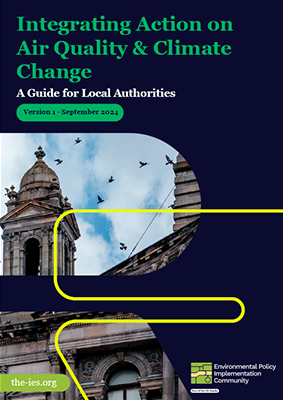Climate change and air pollution are some of the most pressing global challenges of our time. They are also closely related, and there are substantial benefits to tackling both together. By reducing harmful emissions, local authorities can not only contribute to global efforts to combat climate change but also deliver immediate local benefits, including improved air quality and public health.
This guidance outlines:
- The importance of integrating air quality and climate change policy
- How local authorities can develop an integrated approach
- 23 measures that local authorities can take on transport, built environment, waste and procurement, including specific actions, support mechanisms and case studies
The guidance has been produced by the Institution of Environmental Sciences’ Environmental Policy Implementation Community (EPIC). It is a comprehensive update of previous work that Environmental Protection UK first published in 2013, before merging with the Institution of Environmental Sciences to form EPIC.
The guidance has been compiled by expert EPIC members, many of whom play a leading role in formulating and implementing air quality and climate change policy locally. EPIC is also grateful to the numerous external experts who have contributed to and reviewed the guidance. This expertise has enabled us to collate practical, on-the-ground experience with recommendations on how best to tackle air quality and climate change together.
Sarah Legge, Chair of the EPIC Air Quality & Climate Change task group
“We are pleased to be launching EPIC’s Guidance today, to help local authorities integrate action on air quality and climate change. This will support local authorities and others to take more effective action on transport and the built environment, and deliver larger benefits and fewer unintended consequences for the climate, air quality and health.”
Adam Donnan, CEO of the IES
"In 2024 the IES launched a permanent programme of work to support local authorities through EPIC, our Environmental Policy Implementation Community. This was motivated by the critical importance of delivering environmental policy to help make our local communities more resilient, healthy, and sustainable, but we also recognised that local authorities have limited resources to tackle the environmental crises. EPIC's first piece of published guidance presents a unique opportunity for local authorities to maximise the impact of their actions."


